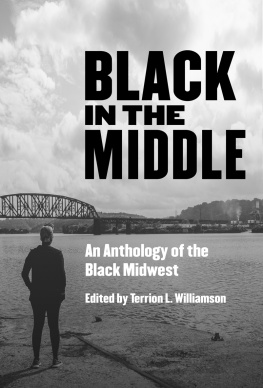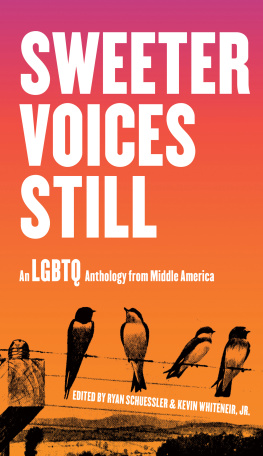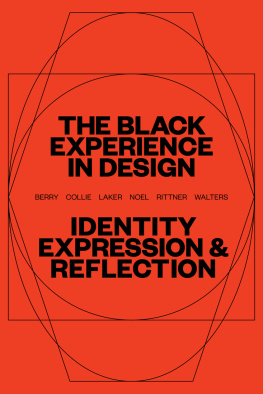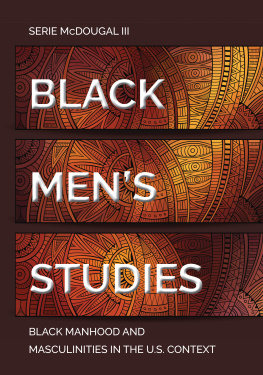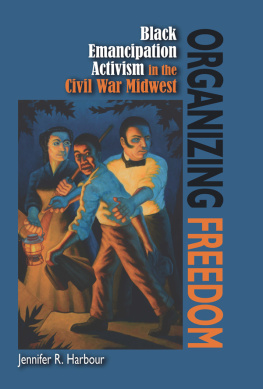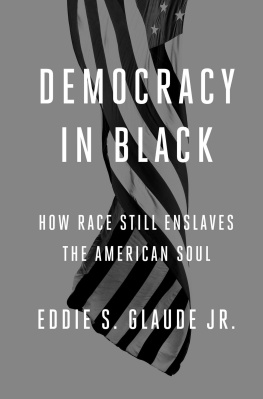
BLACK IN THE MIDDLE
BLACK IN THE MIDDLE
An Anthology of the Black Midwest
Edited by Terrion L. Williamson
Copyright 2020, Belt Publishing
All rights reserved. This book or any portion thereof may not be reproduced or used in any manner whatsoever without the express written permission of the publisher except for the use of brief quotations in a book review.
First Edition 2020
ISBN: 978-1-948742-69-6

Belt Publishing
3143 W. 33rd Street, Cleveland, Ohio 44109
www.beltpublishing.com
Book design by Meredith Pangrace & David Wilson
Cover design by David Wilson
Cover photograph by Njaimeh Njie
BLACK MIDWEST INITIATIVE
The Black Midwest Initiative was launched in the fall of 2017 with the mission of speaking to the dearth of attention given to the complexities of black Midwestern life within the national media, institutions of higher education, the creative arts, and elsewhere. As a platform, we are interested in highlighting the ongoing work people are doing, whether academic, creative, or organizational, that speaks to the experiences of people of African descent living within the Midwest and the larger industrial sector of the U.S. As a progressive collective of people both within and beyond the academy who are dedicated to the cause of social justice, we are deeply invested in attending to issues that affect a whole range of people who identify as black or of African descent, including those who are poor and working class, women or non-binary, Muslim, LGBTQIA, immigrant, and disabled. As individuals who hail from and/or currently live in the Midwest or Rust Belt (a term we use with affection), we understand that the various forms of oppression and marginalization that we struggle against are not the sum total of our existence. Just as we have known pain and suffering and struggle, we have known joy and love and care. So we fightbecause we know that we are worth fighting for.
We stand in solidary with numerous other organizations, collectives, and movements that are committed to the cause of freedom and social justice for black people and other minoritized populations, both in the U.S. and abroad. We see our work as but a small part of a much larger push toward liberation that neither begins nor ends with us, but which we are uniquely situated to contribute to. We welcome anyone who is similarly committed to join with us.
Find out more at theblackmidwest.com
Contents
Jamala Rogers
Terrion L. Williamson
Kevin Young
Tara L. Conley
Jamaal May
Devon Ginn
Aaron K. Foley
Tanisha C. Ford
Terrence Shambley, Jr.
Mark V. Reynolds
Terrion L. Williamson
Courtney Wise Randolph
Kidiocus King-Carroll
Njaimeh Njie
Melissa N. Stuckey
Jeffrey C. Wray
Joe Boyle
Yvonne
Michelle S. Johnson
Edward M. Miggins, ed.
brian g. gilmore
Phyllis May-Machundaa
Katherine Simne Reynolds
David Weathersby
Zuggie Tate
Janice N. Harrington
Leslie Barlow
DeMar Walker
Beverly Cottman
Gabrielle Civil
Rachel Elise Thomas
Kim-Marie Walker
Alexandra Nicome
Deva Rashed-Boone
Wylliam Smith
Zenzele Isoke
Gladys Mitchell-Walthour
Nia Easley
Curtis L. Crisler
Vanessa Taylor
Lyndsey Ellis
Tamara Winfrey-Harris
Ezekiel Joubert III
Jordan Weber
Kisha Nicole Foster
Mary Pattillo
Mikael Chukwuma Owunna
Terrion L. Williamson
Foreword: The Rise of the Fresh Coast
JAMALA ROGERS
In October 2019, I was a presenter at the inaugural Black Midwest Symposium, which was titled Black in the Middle and hosted by the Black Midwest Initiative at the University of Minnesota, Twin Cities. I shared the program booklet with a twenty-something when I got back to St. Louis. She looked slowly at the couple dozen headshots of participants on the front page.
I dont recognize any of these people. There was almost a tinge of guilt in her voice.
Thats exactly the point. No national superstars. Just Black people in the Midwest doing their things in their own remarkable ways.
The symposium brought together writers, students, artists, scholars, organizers, and others to build community and celebrate our unsung contributions to the cultural, political, and economic fabric of the Black Liberation Movement.
It was not ironic that the first gathering would be held in the state where the term Minnesota Nice has come to identify its residents. The mythology suggests that those who live in the state are mild-mannered, reserved, and non-confrontational.
Some years ago, Matt Nelson coined the phrase Fresh Coast. Nelson was an organizer in Milwaukee at the time. The clever expression was his way of elevating the Midwest as an equal to the overshadowing coasts of the East and West. Just without the oceans.
Like a middle child, Black Midwesterners have struggled to project our unique identity, sandwiched between two pretentious sibling coasts. Our collective mannerism often comes across as subdued and unassuming. The history contradicts that myth on so many levels.
The modest posture means that our contributions are often eclipsed by the dazzle of the coasts. The Black in the Middle symposium amplified the genius of those of African descent situated throughout the Midwest and Rust Belt regions. We exist in mostly Red states under the Republican rule and all it heaps on us. Yet still we rise.
The driving goal of the symposium was to create a space where we could share how our Midwestern grounding affects our unapologetic Black lives and worldviews. It bolstered the mutual affirmation and collective knowledge of our accomplishments across several sectorscultural, electoral, academic, housing, and labor.
The symposium panels explored old conceptsspace, freedom and justicein new and creative ways. Extraordinary thinkers and determined catalysts examined these topics using a lens of imagination rooted in the complexities of the region and the country.
The rousing success of the first symposium justifies a second gathering. It was clear that participants made impacts wherever we planted our feet and raised our fists. We will have to step up our game in the current period of anti-Blackness and racialized capitalism. In this next period, I urge us to think about how we will create and strengthen the kind of Black organizations necessary for the challenges we will face.
A weakened Black Left in the U.S. has impacted our capacity to make a serious, collective political analysis and bold strategic moves that register us on the power scale. The Black Liberation Movement has the talent and skills but we must learn from the past lessons of our history. Our brilliance is being overshadowed by mediocrity and disunity. Our people need effective organizations and formidable institutions that can build upon our political, cultural, and economic legacies. We must be committed to nurturing the kind of Blackness based upon common liberatory values and goals.
Next page
